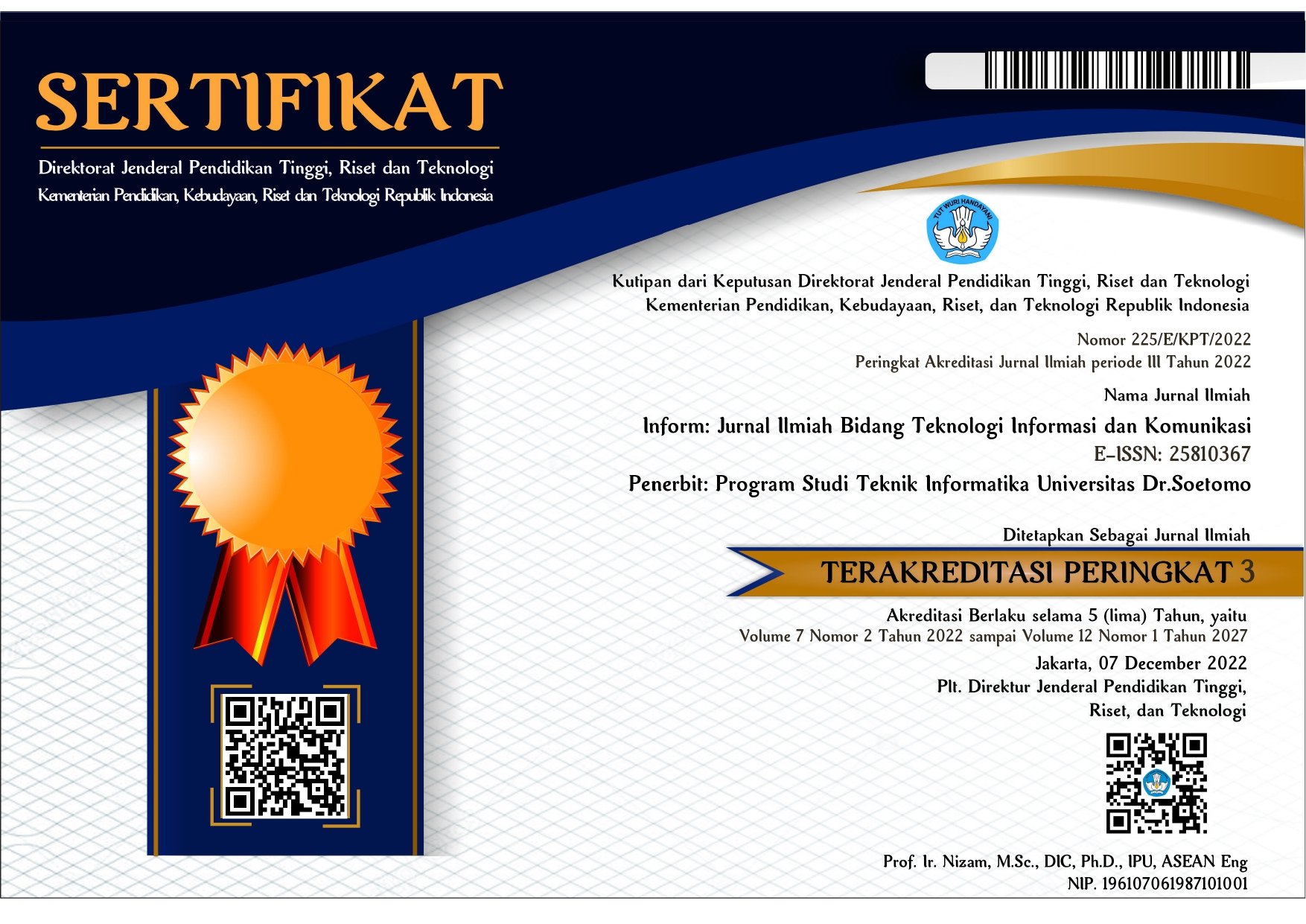Pengaruh Dimensi Kepercayaan Terhadap Adopsi Layanan E-Government
 Abstract views: 1805
,
Abstract views: 1805
,
 PDF (Bahasa Indonesia) downloads: 1300
PDF (Bahasa Indonesia) downloads: 1300
Abstract
Teknologi e-Government berkembang secara pesat, namun pada kenyataannya penggunaan e-Government masih rendah, salah satu faktor yang mempengaruhi rendahnya penggunaan e-Goverment adalah kurangnya kepercayaan, telah ditunjukkan bahwa kepercayaan adalah salah satu faktor yang mempengaruhi kesuksesan dari adopsi e-Government . Penelitian ini bertujuan mengetahui dimensi kepercayaan pada e-Goverment dan hubungannya dengan niat menggunakan e-Government, pada penelitian ini juga memvalidasi 8 dimensi kepercayaan pada e-Government berdasarkan data empiris dan menyajikan hubungan 8 dimensi kepercayaan pada e-Government itu dengan niat menggunakan e-Government. Hasil penelitian ini memberikan kontribusi berupa model berdasarkan pada 8 dimensi trust in e-Goverment dan hubungannya dengan keinginan untuk menggunakan e-Goverment malalui mediasi trust in e-Goverment.
Â
Kata kunci— kepercayaan, dimensi kepercayaan, 8 dimensi kepercayan pada e-government, keinginan menggunaakan e-government.References
[2] Papadopoulou, P., Nikolaidou, M., & Martakos, D. (2010). What Is Trust in E-Government? A Proposed Typology. Proceedings of the 43rdHawaii International Conference on System Science. Hawaii: IEEE Computer Society.
[3] Srivasta, S. C., & Thompson, T. S. (2005). Citizen Trust Development for E-Government Adoption: Case of Singapore.
[4] Warkentin, M., Gefen, D., Pavlou, P., & Rose, G. (2002). Encouraging Citizen Adoption of e-Government by Building Trust. Electronic Markets, Vol.12, No. 3 , 157-162.
[5] Welch, E. W., Hinnant, C. C., & Moon, M. J. (2005). Linking Citizen Satisfaction with E-Government and Trust in Government. Journal of Public Administration Research and Theory, Vol. 15, No. 3 , 371-391.
(2002) The IEEE website. [Online]. Available: http://www.ieee.org/
[6] Zucker, L. G. (1986). Production of Trust: Institutional Sources of Economic Structure, 1840-1920. Research in organizational behavior, Staw, B.M. and Cummings, L.L. (eds.), Vol. 8 , 53-111.
[7] Hung, S. Y., Chang, C. M., & Yu, T. J. (2006). Determinants of user acceptance of the e-Government services: The case of online tax filing and payment system. Government Information Quarterly, 23 , 97–122.
[8] Horst, M., Kuttschreuter, M., & Gutteling, J. (2007). Perceived usefulness, personal experiences, risk perception and trust as determinants of adoption of egovernment services in The Netherlands. Computers in Human Behavior, 23 , 1838–1852.
[9] Gilbert, D., Balestrini, P., & Littleboy, D. (2004). Barriers and Benefits in the adoption of e-government. The International Journal of Public Sector Management, Vol. 17, No. 4 , 296-301.
[10] Chopra, K., & Wallace, W. (2003). Trust in Electronic Environments. Proceedings of the 36th Hawaii International Conference on System Sciences (HICSS’03). Waikoloa, Hawaii: HICSS’03.
[11] Carter, L., & Weerakkody, V. (2008). Egovernment adoption: A cultural comparison. Information systems Frontiers, 10 , 473-482.
[12] Barua, M. (2012). E-Governance Adoption In Government Organization of India. International Journal of Managing Public Sector Information and Communication Technologies (IJMPICT) Vol. 3, No. 1
Copyright (c) 2018 Agung Purwanto, Tony Dwi Susanto

This work is licensed under a Creative Commons Attribution-ShareAlike 4.0 International License.
Authors who publish with Inform: Jurnal Ilmiah Bidang Teknologi Informasi dan Komunikasi agree to the following terms:
-
Authors retain copyright and grant the journal right of first publication with the work simultaneously licensed under a Creative Commons Attribution License (CC BY-SA 4.0) that allows others to share the work with an acknowledgment of the work's authorship and initial publication in this journal.
-
Authors are able to enter into separate, additional contractual arrangements for the non-exclusive distribution of the journal's published version of the work (e.g., post it to an institutional repository or publish it in a book), with an acknowledgment of its initial publication in this journal.
-
Authors are permitted and encouraged to post their work online (e.g., in institutional repositories or on their website) prior to and during the submission process, as it can lead to productive exchanges, as well as earlier and greater citation of published work.












